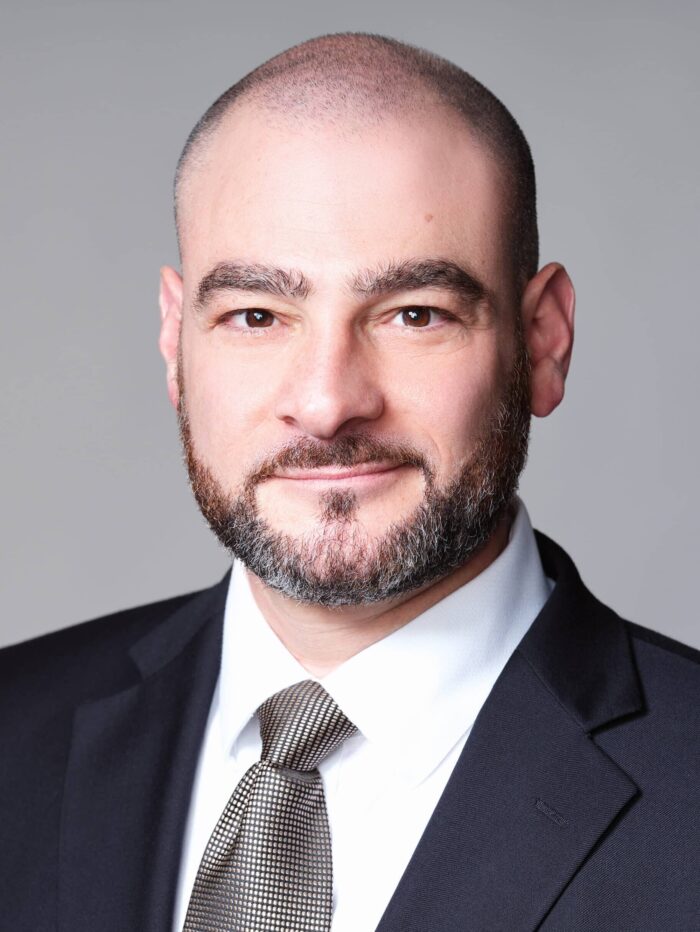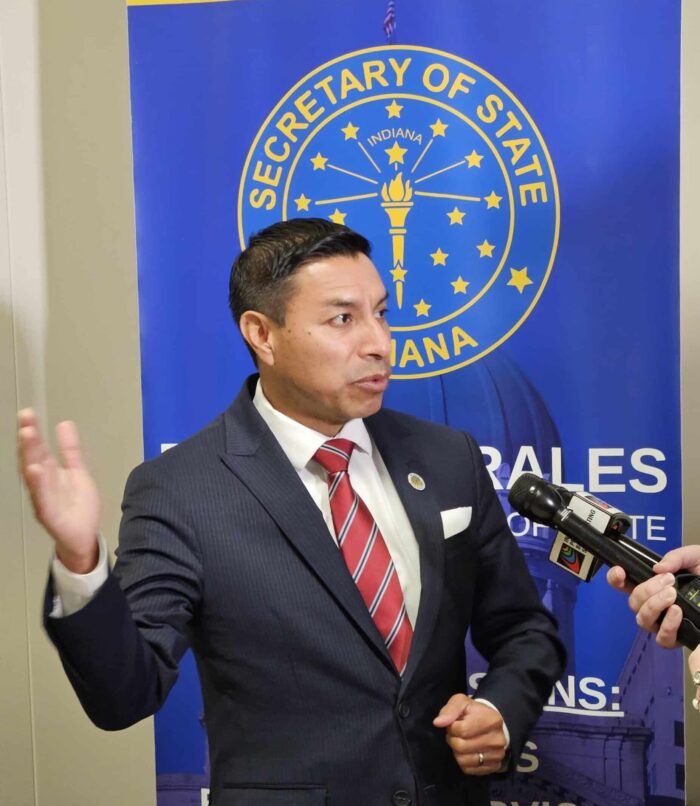
By Marilyn Odendahl
The Indiana Citizen
November 7, 2025
In the wake of Indiana Secretary of State Diego Morales’ decision to turn over the state’s entire voter roll to the U.S. Department of Justice, questions remain about what the federal government will do with the information, but one election expert speculated officials in Washington, D.C., also have no idea what they will do with the data.
Justin Levitt, constitutional law professor at Loyola Marymount University and former deputy assistant attorney general in the Civil Rights Division of the Justice Department, has been following the efforts by the Trump administration to get the voter registration rolls from at least 27 states across the country, including Indiana. Currently, the Department of Justice is suing eight states for not handing over the voter lists, while Indiana is one of at least 10 states that has been identified as providing the registration information.

Levitt said the voter data will likely be used, in part, by President Donald Trump to bolster his “wild claims that are simply unmoored from fact” about the integrity and accuracy of voter rolls. Also, he noted the voter files are being run against the U.S. Department of Homeland Security records, the Social Security database and the Systemic Alien Verification for Entitlements (SAVE) program to try to find noncitizens who are registered to vote.
Even after the data crunching is completed, the federal government may have little to substantiate its voter fraud claims, Levitt said. He pointed to Louisiana, which did an extensive review of its voter rolls after gaining access to the SAVE database in May and, in September, announced it had found 79 potential noncitizens who had voted at least once since the 1980s. The Pelican State’s Republican Secretary of State Nancy Landry concluded, “non-citizens illegally registering or voting is not a systemic problem in Louisiana.”
As for other uses of the data, Levitt speculated the Trump administration might be following the business model of the tech startup industry.
“I think that they have taken a very Silicon Valley approach to collecting this data,” Levitt said. “Part of me thinks they just wanted to grab it and figure out what to do with it later.”
Morales announced in September that his office, in consultation with Indiana Attorney General Todd Rokita’s office, had complied with a request from the Justice Department for Indiana’s voter rolls.
In an Aug. 14 letter to Morales, the Department of Justice requested an electronic copy of the statewide voter registration list. The DOJ letter stated the file “must contain all fields, including the registrant’s full name, date of birth, residential address, his or her state driver’s license number or the last four digits of the registrant’s social security number.”
Although the letter says it had received Indiana’s voter rolls, Morales’ office said that statement was incorrect. The office had not turned over anything to the Justice Department at that time.
According to the letter, the Department of Justice wanted the list to ensure Indiana was complying with the mandates of the National Voter Registration Act and the Help American Vote Act. “In charging the Attorney General with enforcement of the voter registration list requirements in HAVA and the NVRA, Congress plainly intended that DOJ be able to conduct an independent review of each state’s list,” the letter asserted. “Any statewide prohibitions are preempted by federal law.”
Levitt said NVRA and HAVA contain provisions that require states to have a maintenance process to ensure their voter rolls are accurate and up-to-date. However, the federal government is limited to getting a general overview of the maintenance program. Officials can collect stats and learn about the procedure by asking states such things as how many individuals have been removed from the list, how many voters had their information updated, and what is the process for deleting a deceased voter from the list, Levitt said.
However, Levitt said, obtaining a voter roll only provides a snapshot of the state’s registration list and does not provide any information about the maintenance procedure.
“So getting a copy of the voter file isn’t really meaningful in answering the only question the DOJ is authorized to ask, in this respect, which is, ‘Do you have a general program?’” Levitt said. “But there’s a bigger problem, because the federal government is precluded from collecting information on individuals – and there’s special sensitivity around information that reveals First Amendment activity, like voter rolls – unless it does a little bit of homework.”
In particular, he continued, the Privacy Act of 1974 requires the federal government to tell the public “some really basic data management stuff.” This includes what information is being collected, who will have access to the information, how will it be safeguarded and what will be done with it. Not providing public notice before the data is collected is a federal crime, Levitt said.
“There’s no indication, whatsoever, the Department of Justice has complied with the law,” Levitt said about the Privacy Act requirements. “I have looked to find out where the DOJ said, ‘Hey, just a heads up, we’re going to do this.’ I got nothing.”
Similar concerns were raised by U.S. Sens. Alex Padilla, D-California, and Richard Durbin, D-Illinois, in a Nov. 6 letter to U.S. Attorney General Pam Bondi. The senators questioned whether the Department of Justice had the legal authority to demand the voter lists from each state and said collection of the voter rolls creates national security and privacy risks.
Specifically, Padilla and Durbin cited to a New York Times story that the Trump administration is creating a national voter database without any input or oversight from Congress or guardrails on how the database will be used. Also, they said, the single pot of data would be attractive to nefarious actors.
“The Trump Administration’s demands for vast amounts of voter data, aggressive tactics, and the greater potential for a centralized database of sensitive personal information pose an immense cybersecurity risk,” Padilla and Durbin wrote, noting bipartisan secretaries of state resisted turning over their voter information when a similar request was made in 2017 during Trump’s first term. “Our adversaries have attempted to undermine U.S. election integrity before, and the Department is creating a new potential target for them to exploit.”

The only reason Hoosiers know the state’s voter rolls were sent to the Justice Department is because Morales announced it. In an email to The Indiana Citizen, Morales’ office cited to Indiana Code 3-7-38.2-18 as directing the secretary of state to comply with the requirements of the NVRA, which includes responding to requests for information, if the Indiana Election Division does not perform those compliance duties.
However, the statute the secretary of state’s office referenced relates solely to voter list maintenance responsibilities. It does not include any language about sharing the statewide voter file.
Indiana voters asking what information about them can be gleaned from the registration rolls underscores the problem the Privacy Act is designed to prevent, Levitt said.
“The fact that you’re asking the question is part of the problem, because federal law says that you shouldn’t have to guess why the federal government wants this,” Levitt said. “The whole point of the Privacy Act is that they’ve got to tell us.”
Officials with the secretary of state’s office said the information submitted to the Justice Department did not include each registrant’s voting history.
Still, Levitt noted, while the federal government would have such information as an individual’s Social Security number, the voter rolls would have contained data the Trump administration might not otherwise been able to access. Namely, federal officials would not know who in Indiana is registered to vote, which elections they voted in and which party they selected in the primaries.
Levitt expects now that the Trump administration has Indiana’s voter list, Hoosiers will start hearing a lot of noise and nonsense.
Pointing to the previous actions and comments from Trump and federal officials, Levitt suspects the administration will continue to spread false information and now possibly include the Hoosier State in its accusations. He said administration officials have “repeatedly demonstrated they don’t know what they’re doing and also they lie.” Moreover, he noted, Trump has “spouted nonsense about the quality of voter rolls” and made unfounded claims about voter registration lists.
Levitt said he expects the administration officials will run the Hoosier vote file through its systems and then “impugn Indiana’s own data list management” by saying they found “lots of fraud” but offer no evidence to support their accusations.
“I don’t think that Indiana voters will have much to worry about, tangibly, other than the noise, which they should be skeptical of,” Levitt said, adding the “noise” will be coming the White House, the DOJ and the U.S. Department of Homeland Security. “I suspect that you will hear nonsense about the quality of the voter rolls in Indiana or elsewhere.”
Dwight Adams, an editor and writer based in Indianapolis, edited this article. He is a former content editor, copy editor and digital producer at The Indianapolis Star and IndyStar.com, and worked as a planner for other newspapers, including the Louisville Courier Journal.
The Indiana Citizen is a nonpartisan, nonprofit platform dedicated to increasing the number of informed and engaged Hoosier citizens. We are operated by the Indiana Citizen Education Foundation, Inc., a 501(c)(3) public charity. For questions about the story, contact Marilyn Odendahl at marilyn.odendahl@indianacitizen.org.